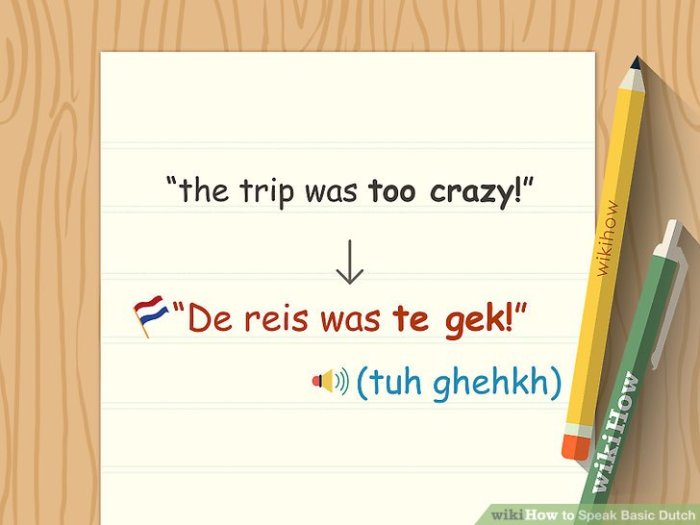How to Speak Dutch Fluently opens the door to a world of linguistic richness and cultural insights, guiding you on a journey to mastering the Dutch language effortlessly.
Exploring the origin, learning resources, essential vocabulary, and cultural nuances, this guide equips you with the tools needed to speak Dutch with confidence.
Overview of Dutch Language

The Dutch language, also known as Nederlands, is a West Germanic language originating from the Low Countries in Northwestern Europe. It is spoken by around 23 million people worldwide, primarily in the Netherlands and Belgium.The history of the Dutch language dates back to the early Middle Ages when it evolved from Old Frankish, which was spoken by the Salian Franks.
Over the centuries, Dutch has been influenced by various languages, including Latin, French, and Low German.
Importance of Speaking Dutch Fluently
Speaking Dutch fluently can open up a world of opportunities, especially for those looking to work or study in the Netherlands or Belgium. It can also enhance cultural experiences and facilitate communication with native Dutch speakers.
- Enhanced Job Prospects: Many international companies have offices in Dutch-speaking countries, and knowing the language can give you a competitive edge in the job market.
- Cultural Understanding: Speaking Dutch allows you to fully immerse yourself in Dutch culture, including literature, music, and traditions.
- Travel Benefits: When traveling to the Netherlands or Belgium, being able to speak Dutch can make your experience more enriching and enjoyable.
Key Characteristics of the Dutch Language
Dutch is known for its distinct features that set it apart from other Germanic languages. Some key characteristics include:
- Pronunciation: Dutch has unique sounds and diphthongs that can be challenging for non-native speakers to master.
- Grammar: Dutch grammar includes gendered nouns, verb conjugations, and word order rules that differ from English.
- Vocabulary: Dutch vocabulary shares similarities with English, German, and French, making it somewhat familiar to speakers of these languages.
Learning Resources for Dutch

Learning a new language like Dutch can be an exciting journey, and having access to the right resources can greatly enhance your learning experience. Here are some recommended online courses, language apps, and methods for learning Dutch effectively.
Online Courses for Learning Dutch
- Rosetta Stone: Known for its immersive approach, Rosetta Stone offers Dutch language courses that focus on speaking and listening skills.
- Duolingo: A popular choice for beginners, Duolingo provides interactive lessons to help you learn Dutch vocabulary and grammar.
- Babbel: With a focus on conversation skills, Babbel offers Dutch courses tailored to your learning goals and interests.
Benefits of Using Language Apps for Practicing Dutch, How to Speak Dutch Fluently
- Convenience: Language apps allow you to practice Dutch anytime, anywhere, making it easy to incorporate learning into your daily routine.
- Interactive Learning: Apps like Babbel and Duolingo offer interactive exercises and quizzes to help you improve your Dutch skills in a fun and engaging way.
- Progress Tracking: Many language apps track your progress and provide feedback to help you stay motivated and on track with your language learning goals.
Comparison of Different Methods for Learning Dutch
- Immersion Programs: Immersion programs offer a full immersion experience in the Dutch language and culture, providing a fast-paced learning environment.
- Self-Study: Self-study allows you to learn at your own pace and focus on the aspects of Dutch that are most relevant to you, but may require more discipline and motivation.
- Tutoring: Working with a tutor can provide personalized instruction and feedback, helping you improve your Dutch skills more quickly, but can be more costly compared to other methods.
Essential Vocabulary and Phrases

Learning essential Dutch vocabulary and phrases is crucial for effective communication in everyday conversations. These phrases can help you navigate various situations and interact with Dutch speakers more confidently.
Common Dutch Phrases for Everyday Conversations
-
Hallo!
-Hello! -
Bedankt!
-Thank you! -
Alsjeblieft – Please
-
Goedemorgen – Good morning
-
Mag ik de rekening alstublieft?
-Can I have the bill, please?
Significance of Learning Dutch Idioms and Expressions
Understanding Dutch idioms and expressions adds depth to your language skills and helps you sound more natural in conversations. Idioms are cultural markers that offer insight into the Dutch way of thinking and can enhance your communication skills.
Importance of Mastering Dutch Pronunciation for Fluency
Mastering Dutch pronunciation is essential for achieving fluency in the language. Proper pronunciation not only ensures clear communication but also helps you be better understood by native speakers. Paying attention to the nuances of Dutch sounds and accents can significantly improve your overall language proficiency.
Cultural Insights for Language Mastery

Understanding the cultural nuances of the Netherlands can greatly improve your fluency in Dutch. By delving into Dutch customs and traditions, you can gain a deeper appreciation for the language and its context.
Dutch Customs and Traditions
- One key aspect of Dutch culture is gezelligheid, which encompasses a sense of coziness, togetherness, and belonging. This concept influences the Dutch language, as it emphasizes the importance of creating warm and inviting social interactions.
- Another tradition is the celebration of Sinterklaas, a holiday where children receive gifts from Sinterklaas, a figure similar to Santa Claus. Learning about this tradition can provide insights into Dutch vocabulary related to the holiday season.
- The Dutch are known for their direct communication style, which can be observed in their language. Understanding this cultural aspect can help you navigate conversations more effectively.
Integrating Cultural Experiences into Language Practice
- Attend cultural events or festivals in the Netherlands to immerse yourself in the language and traditions. This hands-on experience can enhance your language skills and cultural understanding simultaneously.
- Watch Dutch films or listen to Dutch music to familiarize yourself with the language in a cultural context. This exposure can help you pick up idiomatic expressions and colloquial phrases more naturally.
- Engage with native speakers and participate in language exchange programs to not only practice speaking Dutch but also learn about Dutch customs firsthand. Building relationships with native speakers can deepen your cultural insights and language proficiency.
Wrap-Up: How To Speak Dutch Fluently

Embark on your Dutch language journey armed with newfound knowledge and cultural appreciation, paving the way for seamless communication and enriched experiences.